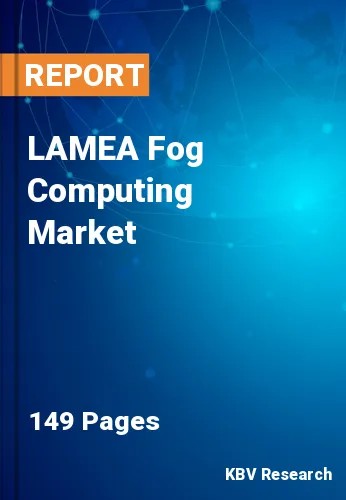Chapter 1. Market Scope & Methodology
1.1 Market Definition
1.2 Objectives
1.3 Market Scope
1.4 Segmentation
1.4.1 LAMEA Fog Computing Market, by Component
1.4.2 LAMEA Fog Computing Market, by Application
1.4.3 LAMEA Fog Computing Market, by Country
1.5 Methodology for the research
Chapter 2. Market at a Glance
2.1 Key Highlights
Chapter 3. Market Overview
3.1 Introduction
3.1.1 Overview
3.1.1.1 Market Composition and Scenario
3.2 Key Factors Impacting the Market
3.2.1 Market Drivers
3.2.2 Market Restraints
3.2.3 Market Opportunities
3.2.4 Market Challenges
Chapter 4. Competition Analysis - Global
4.1 KBV Cardinal Matrix
4.2 Recent Industry Wide Strategic Developments
4.2.1 Partnerships, Collaborations and Agreements
4.2.2 Product Launches and Product Expansions
4.2.3 Acquisition and Mergers
4.3 Market Share Analysis, 2023
4.4 Top Winning Strategies
4.4.1 Key Leading Strategies: Percentage Distribution (2020-2024)
4.4.2 Key Strategic Move: (Partnerships, Collaborations & Agreements: 2020, Jul – 2024, Jan) Leading Players
4.5 Porter Five Forces Analysis
Chapter 5. LAMEA Fog Computing Market by Component
5.1 LAMEA Software Market by Country
5.2 LAMEA Hardware Market by Country
5.3 LAMEA Fog Computing Market by Hardware Type
5.3.1 LAMEA Gateways Market by Country
5.3.2 LAMEA Routers & Switches Market by Country
5.3.3 LAMEA IP Video Cameras Market by Country
5.3.4 LAMEA Sensors Market by Country
5.3.5 LAMEA Micro Data Sensors Market by Country
Chapter 6. LAMEA Fog Computing Market by Application
6.1 LAMEA Smart Manufacturing Market by Country
6.2 LAMEA Connected Vehicles Market by Country
6.3 LAMEA Smart Grids Market by Country
6.4 LAMEA Smart Cities Market by Country
6.5 LAMEA Connected Healthcare Market by Country
6.6 LAMEA Other Applications Market by Country
Chapter 7. LAMEA Fog Computing Market by Country
7.1 Brazil Fog Computing Market
7.1.1 Brazil Fog Computing Market by Component
7.1.1.1 Brazil Fog Computing Market by Hardware Type
7.1.2 Brazil Fog Computing Market by Application
7.2 Argentina Fog Computing Market
7.2.1 Argentina Fog Computing Market by Component
7.2.1.1 Argentina Fog Computing Market by Hardware Type
7.2.2 Argentina Fog Computing Market by Application
7.3 UAE Fog Computing Market
7.3.1 UAE Fog Computing Market by Component
7.3.1.1 UAE Fog Computing Market by Hardware Type
7.3.2 UAE Fog Computing Market by Application
7.4 Saudi Arabia Fog Computing Market
7.4.1 Saudi Arabia Fog Computing Market by Component
7.4.1.1 Saudi Arabia Fog Computing Market by Hardware Type
7.4.2 Saudi Arabia Fog Computing Market by Application
7.5 South Africa Fog Computing Market
7.5.1 South Africa Fog Computing Market by Component
7.5.1.1 South Africa Fog Computing Market by Hardware Type
7.5.2 South Africa Fog Computing Market by Application
7.6 Nigeria Fog Computing Market
7.6.1 Nigeria Fog Computing Market by Component
7.6.1.1 Nigeria Fog Computing Market by Hardware Type
7.6.2 Nigeria Fog Computing Market by Application
7.7 Rest of LAMEA Fog Computing Market
7.7.1 Rest of LAMEA Fog Computing Market by Component
7.7.1.1 Rest of LAMEA Fog Computing Market by Hardware Type
7.7.2 Rest of LAMEA Fog Computing Market by Application
Chapter 8. Company Profiles
8.1 Cisco Systems, Inc.
8.1.1 Company Overview
8.1.2 Financial Analysis
8.1.3 Regional Analysis
8.1.4 Research & Development Expense
8.1.5 Recent strategies and developments:
8.1.5.1 Partnerships, Collaborations, and Agreements:
8.1.5.2 Product Launches and Product Expansions:
8.1.5.3 Acquisition and Mergers:
8.1.6 SWOT Analysis
8.2 Microsoft Corporation
8.2.1 Company Overview
8.2.2 Financial Analysis
8.2.3 Segmental and Regional Analysis
8.2.4 Research & Development Expenses
8.2.5 Recent strategies and developments:
8.2.5.1 Partnerships, Collaborations, and Agreements:
8.2.5.2 Product Launches and Product Expansions:
8.2.5.3 Acquisition and Mergers:
8.2.6 SWOT Analysis
8.3 Dell Technologies, Inc.
8.3.1 Company Overview
8.3.2 Financial Analysis
8.3.3 Segmental and Regional Analysis
8.3.4 Research & Development Expense
8.3.5 Recent strategies and developments:
8.3.5.1 Partnerships, Collaborations, and Agreements:
8.3.5.2 Product Launches and Product Expansions:
8.3.5.3 Acquisition and Mergers:
8.3.6 SWOT Analysis
8.4 Intel Corporation
8.4.1 Company Overview
8.4.2 Financial Analysis
8.4.3 Segmental and Regional Analysis
8.4.4 Research & Development Expenses
8.4.5 Recent strategies and developments:
8.4.5.1 Partnerships, Collaborations, and Agreements:
8.4.5.2 Product Launches and Product Expansions:
8.4.5.3 Acquisition and Mergers:
8.4.6 SWOT Analysis
8.5 Amazon Web Services, Inc. (Amazon.com, Inc.)
8.5.1 Company Overview
8.5.2 Financial Analysis
8.5.3 Segmental Analysis
8.5.4 Recent strategies and developments:
8.5.4.1 Partnerships, Collaborations, and Agreements:
8.5.5 SWOT Analysis
8.6 IBM Corporation
8.6.1 Company Overview
8.6.2 Financial Analysis
8.6.3 Regional & Segmental Analysis
8.6.4 Research & Development Expenses
8.6.5 Recent strategies and developments:
8.6.5.1 Partnerships, Collaborations, and Agreements:
8.6.5.2 Product Launches and Product Expansions:
8.6.5.3 Acquisition and Mergers:
8.6.6 SWOT Analysis
8.7 General Electric Company
8.7.1 Company Overview
8.7.2 Financial Analysis
8.7.3 Segmental and Regional Analysis
8.7.4 Research & Development Expense
8.7.5 Recent strategies and developments:
8.7.5.1 Partnerships, Collaborations, and Agreements:
8.7.6 SWOT Analysis
8.8 Schneider Electric SE
8.8.1 Company Overview
8.8.2 Financial Analysis
8.8.3 Segmental and Regional Analysis
8.8.4 Research & Development Expense
8.8.5 SWOT Analysis
8.9 Hewlett Packard Enterprise Company
8.9.1 Company Overview
8.9.2 Financial Analysis
8.9.3 Segmental and Regional Analysis
8.9.4 Research & Development Expense
8.9.5 Recent strategies and developments:
8.9.5.1 Product Launches and Product Expansions:
8.9.5.2 Acquisition and Mergers:
8.9.6 SWOT Analysis
8.10. Oracle Corporation
8.10.1 Company Overview
8.10.2 Financial Analysis
8.10.3 Segmental and Regional Analysis
8.10.4 Research & Development Expense
8.10.5 SWOT Analysis

